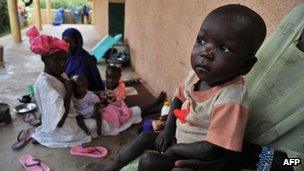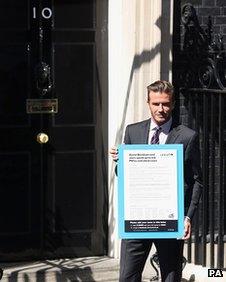Anti-hunger petition goes to Downing Street
- Published
- comments

More than one million children in the Sahel region are at risk of severe malnutrition, charities say
Petitions from aid charities, signed by 500,000 people, calling for government action to combat global hunger have been handed in to Downing Street.
They want action in regions including Sahel, West Africa, where more than 18 million people are suffering from the impact of drought and high food prices.
They say Britain should use its 2013 G8 presidency to tackle hunger and try to save a million lives a year.
PM David Cameron has convened a global hunger summit in London on Sunday.
The gathering - on the last day of the Olympic Games - will bring together world leaders, business figures, non-government organisations and development campaigners in an effort to generate renewed momentum behind tackling malnutrition in Africa and other parts of the world.
'Next meal'
The Guardian, external has reported that British 10,000m gold medal winner Mo Farah - who was born in Somalia - is to attend the summit, although Downing Street has refused to confirm this.
The prime minister told ITV's Daybreak programme the world "needed to put its money where its mouth is" to save the lives of children in developing countries.
The UK could be "proud" of its record on overseas aid, he added, but the global attention on London at the moment gave the UK an opportunity to show it "cares about the poorest in the world".
"I wanted to do this during the Olympic Games. We are all thinking about the next gold medal, but there are millions of children around the world who are thinking, 'am I going to get the next meal?"

David Beckham has told Mr Cameron progress on hunger could be a lasting legacy of London 2012
Last week, Save the Children and World Vision warned that more than one million children in the Sahel region were at risk of severe malnutrition.
The Sahel region is an impoverished area that includes Mauritania, Mali, Niger, Burkina Faso, Senegal and Chad.
The charities said the main cause was a lack of protection against shock price rises, and said they wanted more investment to protect against food insecurity.
The deaths of 200,000 children each year could be linked to malnutrition, they added.
At the end of last month, ex-England footballer and Unicef ambassador David Beckham met Mr Cameron at Downing Street to urge the UK to ensure child hunger remains a global priority.
He handed the prime minister a letter, signed by 50 sports and film stars, urging him to "pick up the pace" on the issue when the UK takes over leadership of the G8 group of nations next year.
Unicef's UK director, David Bull, said things could be done immediately such as increasing the advice given to parents and stressing the importance of breastfeeding as a source of vital nutrients.
"We know what the solutions are - some of them are terribly simple," he told the BBC. "In the long term, we need to tackle the poverty and inequality that causes under-nutrition."
He added: "We believe that it is the right time to raise the issue and we are so excited that we have had so much public support."
- Published1 August 2012
- Published26 July 2012
- Published18 January 2012